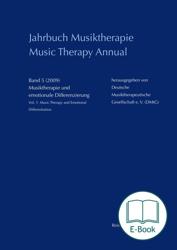This volume deals with emotional differentiation, with differentiation of affects, and with regulation of affects in music therapy. Therapists generally address their attention to the manner in which the emotional expression changes, is refined, or is broken in the course of therapy. Music therapists have special access to the emotions of patients through their continuous use of music. In previous centuries, it was already assumed that joy, sorrow, and pain could be expressed through music, and that music could also call out these emotions. Specific compositional stylistic elements have been used to produce specific emotional expressions. These types of experiments were observed already during the Renaissance, and during the Baroque period there were various theorists entrenched in affective teaching. The essays collected here attempt to build a bridge from the baroque affective teachings to contemporary music therapy and provide an overview of the state of today's research on emotion.
Hauke Egermann
received in 2000 his University Entrance Diploma at a music-specialized secondary school in Germany. 2001 he started studying Systematic Musicology, Media Science, and Communication Studies in the Magister Artium program at the Hanover University of Music and Drama. He received his M. A. in 2006 by conducting an online study on the emotional effects of music. Subsequently he completed the 3-year PhD-program at the Center of Systemic Neurosciences Hanover were he finished his dissertation about social influences on musically induced emotion using psychophysiological methods. During his Master’s and PhD studies he was employed as Student and Research Assistant at the Institute of Music Physiology and Musicians’ Medicine. In parallel he has also worked freelance for different research and consulting companies, investigating marketing strategies. Starting December 2009 he will be Postdoctoral Fellow at the Schulich School of Music, McGill University, Montreal, Canada.
Rolf Klüwer
Prof. Dr. phil., Psychoanalytiker DPV. Promovierte 1953 in Köln als Psychologe und ließ sich in München, Zürich und Frankfurt psychoanalytisch ausbilden. Ab 1964 war er zunächst wissenschaftlicher Mitarbeiter am Sigmund-Freud-Institut in Frankfurt, später dort als Professor und wissenschaftliches Mitglied Leiter der Abteilung für Ausbildung. Viele Jahre auch am Institut für analytische Kinder- und Jugendlichenpsychotherapie in Frankfurt in der Ausbildung tätig. Seit 1989 wieder in freier Praxis, nun im Ruhestand. Zahlreiche Veröffentlichungen vor allem zur Fokaltherapie und zu Fragen der Technik.
Angela Knoche
Master of Arts (Musiktherapie), Diplom-Musikerin. Nach dem Abitur vierjähriger Auslandsaufenthalt mit Studium an der britischen University of Keele und Abschluss Bachelor of Arts in Music and Russian Studies. Danach Klavierdiplom und Künstlerische Ausbildung an der Musikhochschule Würzburg und Hochschule für Kirchenmusik Heidelberg. Über zehnjährige Unterrichtstätigkeit an verschiedenen Musikschulen. Konzerte, Liedbegleitung, Teilnahme an zahlreichen Meisterkursen in Deutschland und England. Dann Neuorientierung und Studium der Musiktherapie im Masterstudiengang an der Fachhochschule Frankfurt am Main. Seither als Musiktherapeutin u.a. auf zwei Stationen der Allgemeinpsychiatrie des Pfalzklinikums, Rheinland-Pfalz tätig. Schwerpunkt dort auf der Behandlung von Patienten mit affektiven Störungen und emotional-instabilen Persönlichkeitsstörungen.
Sylvia Kunkel
Dr. sc. mus., Dipl.-Musiktherapeutin und Dipl.-Musikpädagogin. Studium der Musikpädagogik an der Hochschule für Musik „Franz Liszt“, Weimar; Zusatzstudium Musiktherapie an der WWU Münster, Promotion an der Hochschule für Musik und Theater, Hamburg. Seit 1993 Musiktherapeutin an der Klinik für Psychiatrie und Psychotherapie am Universitätsklinikum Münster, seit 1996 Lehrbeauftragte im Zusatzstudiengang Musiktherapie an der Westfälischen Wilhelms-Universität Münster, darüber hinaus tätig als Klavierlehrerin und Chorleiterin. Arbeits- und Forschungsschwerpunkte sowie Veröffentlichungen zu den Themen Musiktherapie in der Psychiatrie und Musiktherapie mit schizophrenen Patienten.
Dorothea Oberegelsbacher
Mag. Art., Dr. phil., Wien. Musiktherapeutin, Psychologin und Psychotherapeutin in freier Praxis. Lehrt Musiktherapie an der Universität für Musik und darstellende Kunst Wien sowie Psychotherapiewissenschaften an der Sigmund Freud Privat Universität Wien. 1997 Mitbegründerin des Wiener Instituts für Musiktherapie. Weitere Lehrtätigkeit im In- und Ausland. Über 50 Publikationen, darunter die Fachbücher „Il potere di Euterpe. Musicoterapia a scuola e con l’handicap“ (2003, Milano FrancoAngeli, gemeinsam mit G. Rezzadore), sowie „Lehrbuch Musiktherapie“ (2008, Ernst Reinhardt UTB, gemeinsam mit Decker-Voigt und Timmermann). Forschungsschwerpunkt Psychotherapie mit „poor comunicators“.
Irmtraud Tarr
Dr. phil, Psychotherapeutin für Kinder und Jugendliche, Lehrtherapeutin am EAG, arbeitet als Psychotherapeutin und Musiktherapeutin in eigener Praxis in Rheinfelden. Als Konzertorganistin ist sie international tätig (Europa, Japan, USA) und hat zahlreiche Aufnahmen für Tonträger, Funk und Fernsehen gemacht. Ihre CDs - fast sämtliche auf historischen Orgeln - hat sie in Frankreich, Spanien, Portugal, Italien, Deutschland und Lettland gemacht. Außerdem hat sie zahlreiche Notenausgaben für Orgel herausgegeben. Unter ihren mehrfachen Auszeichnungen und Preisen sind die Verdienstmedaille der Stadt Rheinfelden in Silber für kulturelle Verdienste (2003), sowie weitere aus Bayern und Tschechien zu nennen. Sie ist Autorin von inzwischen 28 Büchern, die in vielen Sprachen übersetzt wurden.
Bettina Weixler
Mag. Phil. Mag. Art. Studium Musikwissenschaft an der Universität Wien (Diplomthema: Affekte in Kantaten J. S. Bachs); laufendes Doktoratsstudium Musikwissenschaft; Studium Musiktherapie an der Universität für Musik und darstellende Kunst Wien (Diplomthema: J. S. Bach in der Musiktherapie). Derzeit im geriatrischen Arbeitsfeld musiktherapeutisch tätig.


 Preface
Preface